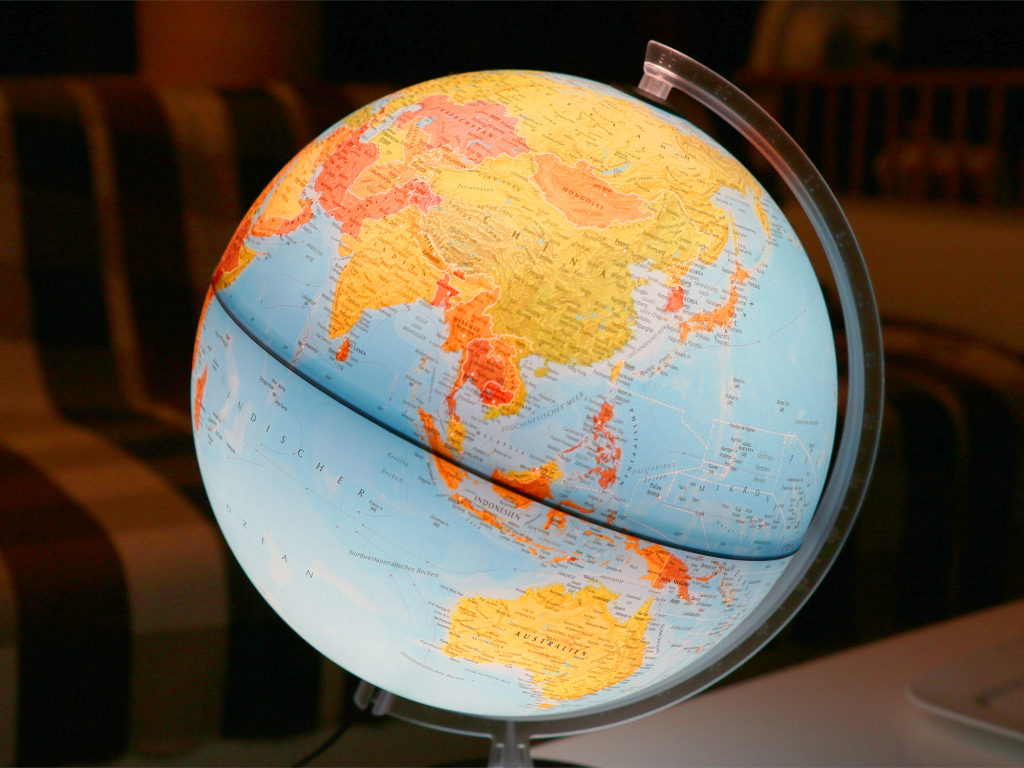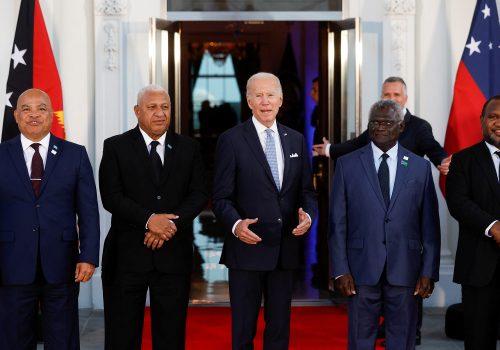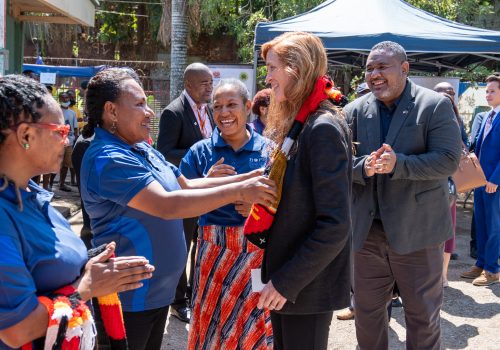Bolstering cooperation among Quad and Pacific Island countries
Executive summary
As the geopolitical relevance of the Pacific Islands has grown, so too has the attention paid to them by the outside world—including an influx of diplomatic attention, development assistance, and more as external powers seek to curry favor with the sixteen countries. Australia, India, Japan, and the United States—which collectively comprise the Quadrilateral Dialogue (known as the Quad)—have independently and collectively scaled up their engagement with the Pacific Islands.
In doing so, the Quad has sought to pursue a positive, practical agenda that aligns with the Pacific Islands Forum (PIF)’s 2050 Strategy for the Blue Pacific Continent.
Broadly speaking, the PIF members welcome the Quad, but some are critical of the “free and open Indo-Pacific” narrative that undergirds it. As the Quad seeks to bolster its engagement in the Pacific Islands, it should ensure that it accounts for the unique challenges facing this vast maritime region, which relies heavily on foreign assistance.
In 2023, the Quad announced a range of programmatic initiatives intended to address key regional issues, including climate, connectivity, economic development, and maritime security. The bloc is currently standing on solid ground, but the group is still finding its footing as a new player in the complex multilateral architecture in the Pacific Islands.
Looking forward, it should embrace four broad-based, cross-cutting policy recommendations that align with the stated priorities of the Quad, its member states, and Pacific Island countries:
- Prioritize programs that bolster physical and digital connectivity, such as the Quad Partnership for Cable Connectivity and Resilience that was announced at the 2023 Quad Leaders’ Summit.
- Emphasize maritime domain awareness and enforcement by providing partners with tools to facilitate greater enforcement capacity and enhanced monitoring.
- Implement positive, practical programs in areas of strategic advantage that fit into an already-complex regional donor landscape and meet Pacific needs.
- Take a forward-leaning approach to public diplomacy, including through elevated branding that proactively communicates intent, emphasizes shared values, and does not overemphasize geopolitics.
Introduction
As the geopolitical relevance of the Pacific Islands has grown, so too has the attention paid to it by the outside world. Other issues, from climate change to fisheries, drive engagement as well—but geopolitics is what has drawn the lion’s share of international media coverage and interest from decision-makers in foreign capitals who do not focus on the region day-to-day.
This, in turn, has brought an influx of diplomatic attention, development assistance, and more as external powers seek to curry favor with the sixteen Pacific Island countries.1The Pacific Islands Forum includes eighteen countries and territories. Quad member Australia is a Pacific forum member but is excluded from the count for the purposes of this paper, as is New Zealand, a forum member that is part of the Five Eyes intelligence group along with Australia, Canada, the United Kingdom, and the United States. Included in this Pacific Islands count are forum members: Cook Islands, Federated States of Micronesia, Fiji, French Polynesia, Kiribati, Nauru, New Caledonia, Niue, Palau, Papua New Guinea, Republic of Marshall Islands, Samoa, Solomon Islands, Tonga, Tuvalu, and Vanuatu. As the most aid-dependent region in the world, this recognition is welcomed, but Pacific Islanders remain leery about geopolitical competition and the detrimental impact it could have on their sovereignty and well-being.
Australia, India, Japan, and the United States have independently and collectively scaled up their engagement with these Pacific Islands. In 2007, the four countries formed the Quadrilateral Dialogue (the Quad), which has become an increasingly important element of the Indo-Pacific’s growing multilateral architecture. It serves as a forum for addressing shared challenges across the Indo-Pacific, including in the Pacific Islands.
In February and March 2024, the Indo-Pacific Security Initiative (IPSI) of the Atlantic Council’s Scowcroft Center for Strategy and Security convened public and private discussions with governmental and nongovernmental experts from Quad member states and Pacific Island countries to formulate policy recommendations for the bloc as it expands activities in the region.
The collective output of those discussions, in turn, is the basis for this policy brief, which provides an overview of the relationship between the Quad and the Pacific Islands as it stands today, followed by a series of policy recommendations for the former as it seeks to bolster its engagement with the latter over the coming years.
The Quad and the Pacific Islands: An overview
It is no coincidence that the Quad’s revival in 2017 came at a time of heightened geopolitical competition in the Indo-Pacific. As noted in the 2023 Joint Leaders’ Statement, its members are committed to ensuring “a free and open Indo-Pacific that is inclusive and resilient” and one where “all countries are free from coercion, and can exercise their agency to determine their futures.”
Alongside other fora, the Quad has become an increasingly important node in the Indo-Pacific’s growing “minilateral” architecture. Cooperation within it focuses on six key areas—climate, critical and emerging technology, cyber, health security, infrastructure, and space—that are reflected by the bloc’s formal leader-level working groups.
While they may skate around thornier issues that could divide the bloc, these agreed-upon priority areas have helped the Quad formulate a positive, practical agenda that will benefit not just the four Quad countries but also partner nations. Leaders’ meetings have become an annual occurrence and overall cohesion in the bloc has increased—no small feat, considering how quickly it went dormant after being first conceived in 2007.
Along with its thematic focus areas, the Quad has emphasized cooperation with countries in three key Indo-Pacific subregions—Southeast Asia, the Pacific Islands, and Indian Ocean rim—and expressly acknowledged the centrality of their respective multilateral forums: the Association of Southeast Asian Nations (ASEAN), Pacific Islands Forum (PIF), and the Indian Ocean Rim Association (IORA).
In the Pacific Islands, the Quad has sought to align itself with the objectives of the 2050 Strategy for the Blue Pacific Continent (2050 Blue Pacific Strategy), a long-term road map for addressing key regional issues that were agreed upon by PIF members in 2022. The PIF strongly encourages external partners to work within this framework, and the Quad’s commitment to supporting its objectives is an important sign of respect for regional institutions.
It should be noted that the PIF is not the only regional institution in the mix; others, such as the Melanesian Spearhead Group (MSG), cater to subregions and may deviate from the PIF at times and contend with it for influence. Furthermore, each of the sixteen Pacific Island countries have unique cultures, histories, and interests. It is therefore important that the Quad members build bilateral relationships with each country rather than opting for the easier route of painting the region with a monolithic brush.
Regional footprint of Quad members
Outside of the Quad framework, Canberra, New Delhi, Tokyo, and Washington also independently maintain regional presences that reflect each country’s unique priorities and interests. The added value of the bloc is its ability to capitalize on members’ regional initiatives to maximize the efficiency and impact of joint initiatives.
Of the four, Australia has historically been the most engaged in the region. It is a PIF member, maintains a comprehensive diplomatic footprint with missions in all sixteen Pacific Island countries, and is by far the single largest aid donor to the region. Canberra possesses unmatched levels of deep and long-term engagements with the Pacific Island countries, but, as with any long-standing bilateral relationship, this inevitably comes with areas of tension.
India has long maintained an interest in Fiji due to the latter’s large Indo-Fijian population but remains a relatively new player in the Pacific Islands region. Its amplified Pacific Islands engagement flows from a broader effort by Prime Minister Narendra Modi to enhance India’s global footprint. For instance, Modi’s 2023 visit to Papua New Guinea included the announcement of a strategic action plan to expand cooperation on a diverse issue set with Pacific Island countries.
Japan has a long history in the region and ramped up its modern-day engagement in the late 1990s, initiating the Japan-Pacific Islands Leaders Meeting (PALM) mechanism in 1997. It is the region’s second-largest provider of overseas development assistance and well-known for its focus on infrastructure and fisheries. As the originator of the “free and open Indo-Pacific” concept, it has been a leading voice for increasing regional cooperation through mechanisms like the Quad.
The United States has deep regional roots due to its ties with the three freely associated states2The Federated States of Micronesia, the Republic of the Marshall Islands, and the Republic of Palau are referred to as the freely associated states. (FAS) and the geographic location of the US State of Hawaii within Polynesia. The United States significantly scaled back its regional presence in the early 1990s and only truly returned to previous levels of engagement in the late 2010s due to rising geopolitical competition. Since then, it has reestablished itself as a regional player by amplifying development aid, opening new embassies, and more—but questions linger about its long-term reliability and staying power.
All four countries have broadened their engagement in the region. Although Australia is the only full member of the PIF, India, Japan, and the United States hold observer status. They also maintain their own dialogue mechanisms with Pacific Island countries—for example, India’s Forum for India-Pacific Islands Cooperation and the now-annual US-Pacific Island Forum Leader’s Summit. Additionally, Australia, Japan, and the United States are members of the Partners in the Blue Pacific (PBP) mechanism.
The view from the Pacific Islands
With a collective exclusive economic zone (EEZ) of over sixteen million square kilometers, the Pacific Islands occupy nearly 10 percent of the world’s maritime space. In recent years, Pacific Island countries have sought to define themselves as “large ocean states” instead of the more common moniker of “small island states.” Their maritime nature is a defining, cross-cutting feature of the region.
Broadly speaking, the Quad has been welcomed, albeit not universally. Some are critical of the “free and open Indo-Pacific” narrative that undergirds it, arguing among other things that it is incompatible with the 2050 Blue Pacific Strategy and could “funnel resources away from investment in Blue Pacific interests and objectives.” Others contend that the Quad is an unnecessary addition to an already complex multilateral landscape.
As the Quad expands its engagement with the Pacific Island countries, it is important to consider how regional actors define and view key international challenges, especially when such definitions and views may differ from those espoused by Quad members. The PIF’s 2018 Boe Declaration, which incorporates traditional and nontraditional security issues into a single definition of security, is perhaps the most pertinent example.
Climate change, which Pacific Island countries see as their single greatest threat, is central to their definition of security. Quad members, in the 2023 Joint Leaders’ Statement, did expressly acknowledge the significance of climate change as it pertains to global security. However, their words have not always aligned with actions taken on the issue at home, which in turn has periodically strained relations due to perceptions that Quad members’ climate rhetoric is more talk than action.
There are diverging views on geopolitics, but a general through line is a desire to maintain peace, stability, and positive relations with external parties. This is exemplified by Fijian Prime Minister Sitiveni Rabuka’s Zone of Peace concept, which is “deeply rooted in Pacific ideas of family and relationships,” and was welcomed by many Pacific Island leaders at their 2023 PIF retreat.
The development and economic challenges facing Pacific Island countries may be similar to those faced by other developing countries, but they are exacerbated by the region’s vast maritime nature and imminent challenges stemming from climate change. Although there are notable variances between the individual countries, the common priorities include but are by no means limited to disaster management, fisheries, labor mobility, infrastructure, public health, and regional connectivity.
Current Quad-Pacific Islands initiatives
Although the Pacific Islands were briefly referenced in the 2021 Joint Statement of Quad Leaders, the focus on this expansive subregion has grown exponentially since then. A range of programmatic announcements, many of which pertain to the Pacific Islands, were made at the 2023 Leaders’ Summit, including:
- Climate: Quad Climate Change Adaptation and Mitigation Package to accelerate regional cooperation on climate resilience.
- Critical and Emerging Technology (CET): Establishment of an Open Radio Access Network (Open RAN) with Palau, the first of its kind in the Pacific Islands.
- Cyber: Quad Joint Principles for Cybersecurity Partnership to strengthen defenses against cyber threats to critical infrastructure and services.
- Health Security: Quad Health Security Partnershipto strengthen coordination and collaboration in support of health security in the Indo-Pacific.
- Infrastructure: Quad Partnership for Cable Connectivity and Resilience to strengthen cable systems in the Indo-Pacific.
- Space: Exploring avenues to deliver Earth observation data and other space-based applications to assist nations across the Indo-Pacific in strengthening climate early warning systems.
The Joint Leaders’ Statement positively signals the Quad’s intent to work in partnership with the Pacific Islands region and to align programs with the 2050 Blue Pacific Strategy, stating that, “In these efforts, Quad Leaders will listen to and be guided at every step by Pacific priorities.” These programs are only in the preliminary stages of implementation, though, and successful delivery will be crucial to achieving long-term goals.
Policy recommendations
As the Quad looks ahead this year and beyond, it is both standing on solid ground and still finding its footing in the Pacific Islands. Moving forward, the bloc should continue to pursue achievable, practical policies that deliver on Pacific needs while ensuring the Quad is not stretched too thin. In addition, the Quad should take a forward-leaning public diplomacy approach that helps it win over public opinion and build stronger ties with Pacific Island countries.
To support these efforts, IPSI convened a February 2024 public panel discussion, “Bolstering Cooperation among Quad and Pacific Island Countries,” that featured speakers from all four Quad members and the Pacific Islands, including His Excellency David Panuelo, the former president of the Federated States of Micronesia (FSM). IPSI also convened a private track 1.5 workshop, which was attended by thirty-three government and nongovernment experts.
What resulted from the panel discussion and workshop are four broad-based, cross-cutting policy recommendations. These are by no means exhaustive; rather, they reflect the themes most frequently raised and are intended to align with the stated goals of the Quad, its member states, and the Pacific Island countries.
1. Prioritize programs that bolster physical and digital connectivity
As noted previously, the region’s expansive maritime scale cuts across every issue facing it. Pacific Island countries are geographically isolated, and their isolation is further exacerbated by limited physical connectivity. Physical infrastructure is an issue that is frequently raised in the region, and there are urgent needs for the construction and refurbishment of new and existing facilities: ports, highways, airports, and the like.
Digital connectivity presents a crucial opportunity to circumvent geographic barriers, but most Pacific Island countries are not adequately connected to transnational undersea cable systems. Furthermore, they face challenges with building sufficient telecommunications networks within their own borders. That is why technology and connectivity emerge as one of the seven thematic areas of the 2050 Blue Pacific Strategy
Improving physical and digital connectivity would unlock opportunity across the region, especially on the economic front. The Quad has acknowledged the issue’s centrality in joint statements and laid out concrete programs to improve it throughout the Indo-Pacific. For the Pacific Islands region, this includes the Quad Partnership for Cable Connectivity and Resilience initiative (noted above), and at a country-level includes the Palau Open RAN program (also noted above).
In this and coming years, the Quad should maintain its focus on programs that improve connectivity, especially in the digital realm. The CET and infrastructure working groups are well positioned to continue their work on cables. As the digital realm increases in complexity, the Quad should consider how the space working group can help deliver satellite-based internet coverage—which is in high demand in the Pacific Islands.
It should be noted that this is an area where the Quad can capitalize on existing programs initiated by one or more member states. One example is Australian and US support for incorporating eight Pacific Island countries into US-based Google’s plans for a trans-Pacific subsea cable. Through such a mechanism, the Quad can build upon existing work rather than start from scratch. It also demonstrates the value of bringing private-sector partners into the fold to maximize impact.
2. Emphasize maritime domain awareness and enforcement
Maintaining the territorial integrity of their maritime space is a daunting task for Pacific Island countries. To illustrate, the FSM has an EEZ of almost three million square kilometers and the Solomon Islands has an EEZ of one and a half million square kilometers. Both countries face acute difficulties when seeking to monitor and enforce these EEZs owing to a wide range of resource limitations, from patrol boats to human capital.
The significance of this issue is noted in the 2050 Blue Pacific Strategy, which calls to protect “sovereignty and jurisdiction over our maritime zones and resources” and to “strengthen our ownership and management of our resources.” Yet the ability to do so is under imminent threat from foreign state and nonstate actors on matters ranging from narcotics trafficking to illegal fishing, both of which have increased in recent years.
Echoing this, the Quad announced the Indo-Pacific Partnership for Maritime Domain Awareness (IPMDA) initiative at the 2022 Leaders’ Summit, which aims to “provide near-real-time, integrated and cost-effective maritime domain data to maritime agencies in Southeast Asia and the Pacific.” This, in turn, provides each country with useful tools to help navigate responses to natural disasters and monitoring of climate patterns.
Looking forward, the Quad should consider how the resources it offers can facilitate greater enforcement capacity and enhanced monitoring for Pacific Island countries. One area worth exploring is coordinating the provision of patrol boats, which individual members have historically provided on a bilateral basis. The Quad should not duplicate existing programs; instead, it should serve as a coordination hub to ensure maximally beneficial allocation across the region.
3. Implement positive, practical programs in areas of strategic advantage
While the Quad holds a lot of promise, it should be careful to not overextend itself and become another flashy diplomatic initiative that overpromises and underdelivers. To do so, the Quad can align its strategic advantages with priorities identified by the Pacific Island countries themselves.
As outlined earlier, individual Quad members have unique histories with specific Pacific Island countries. However, the Quad itself is viewed with some skepticism due to its relatively new advent, collapse, and reemergence onto the scene. Australia, India, Japan, and the United States seem to be cognizant of this issue, and their emphasis on positive, practical programs with tangible outcomes will help allay skepticism.
In addition, Quad members should clearly and consistently communicate what they can and cannot do, and how they envision Quad-driven initiatives fitting into an already-complex donor landscape. Doing so will help manage inevitable misunderstandings that tend to come with new initiatives and allow it to focus on producing results that earn credibility and trust from Pacific Islanders.
The bloc has been met with fanfare and gained staunch support in Canberra, New Delhi, Tokyo, and Washington. However, the attention of and priorities for these capitals are becoming split in multiple directions as increasing threats across the world lead to limit the resources and time that can be devoted to the Pacific Islands. Quad and Pacific Island countries alike should be careful not to place all their bets on the Quad, lest it collapse under its own weight.
4. Take a forward-leaning approach to public diplomacy
Globally, the information domain has become more competitive, fast-moving, and fragmented. At both a regional and country level, the Pacific Islands region has a particularly unique information space due to limited digital connectivity and a geographic location that any external actor must fully comprehend in order to seek engagement with local populations.
The Quad may have started off on the right foot, but there is still much to be accomplished to maintain an advantage in the information space, especially as it becomes increasingly contested due to geopolitical competition. Ultimately, Quad members’ status as the partners of choice for many Pacific Island countries is at risk if a forward-leaning approach to public diplomacy is not implemented.
Specific recommendations for implementing this approach include the following:
- Proactively communicate intent: Stress that the Quad is meant to complement, not supersede or replace, the existing regional architecture. Building upon the shift in its official name from the Quadrilateral Security Dialogue to the Quadrilateral Dialogue, it should make a more concerted effort to expand its focus beyond just traditional security issues. Doing so will quell apprehensions from the region regarding the true nature of the Quad’s intentions for the region.
- Emphasize shared values: Quad and Pacific Island countries share democratic values—democracy, rule of law, freedom of speech, and more—that should be actively highlighted. But doing so requires that Quad members practice what they preach at home, lest they open themselves up to charges of hypocrisy.
- Do not overemphasize geopolitics: Pacific Islanders are well aware of the growing geopolitical competition in the Indo-Pacific and the impact it may have on their region. Overly aggressive rhetoric about it may resonate in the capitals of Quad member states, but much less so in the Pacific Islands. It certainly should be discussed at times, but it should not be the overarching crux of public interactions.
- Elevate branding: If the Quad is to achieve its goals, it must back up its rhetoric with concrete evidence of successful implementation of initiatives on the ground. One of the best ways to do so is through physical and digital branding that clearly indicates that the Quad or one of its member states is delivering and working with Pacific Island countries to implement a project. Although Australia and the United States have sometimes been reluctant to elevate branding alongside their individual development programs, the Quad presents an opportunity for a fresh approach.
Parker Novak, the primary author of this issue brief, is a nonresident fellow with the Atlantic Council’s Global China Hub and Indo-Pacific Security Initiative, where he specializes in Southeast Asia, the Pacific Islands, Indo-Pacific geopolitics, and US foreign policy. He previously served as the Indonesia and Timor-Leste country director for an international non-governmental organization.
Kyoko Imai, the project lead and contributor to this issue brief, is the associate director for the Indo-Pacific Security Initiative (IPSI) of the Atlantic Council’s Scowcroft Center for Strategy and Security. She spearheads IPSI’s work on US-ROK-Japan, Quad, AUKUS, and other multilateral frameworks, in addition to the Japan, Southeast Asia, and Pacific Islands portfolios. Imai’s functional expertise centers on non-traditional security including but not limited to economic security, human rights, climate security, and migration.
Related content

The Indo-Pacific Security Initiative (IPSI) informs and shapes the strategies, plans, and policies of the United States and its allies and partners to address the most important rising security challenges in the Indo-Pacific, including China’s growing threat to the international order and North Korea’s destabilizing nuclear weapons advancements. IPSI produces innovative analysis, conducts tabletop exercises, hosts public and private convenings, and engages with US, allied, and partner governments, militaries, media, other key private and public-sector stakeholders, and publics.
Image: REUTERS/Loren Elliott


